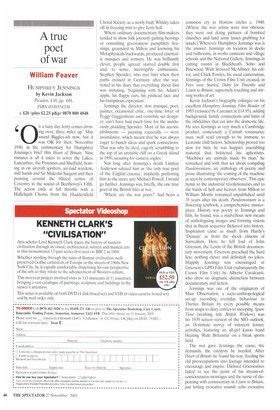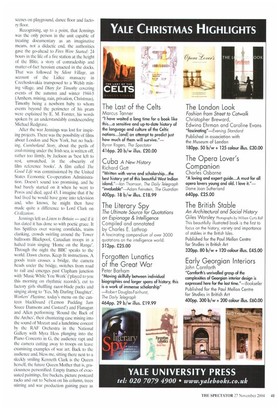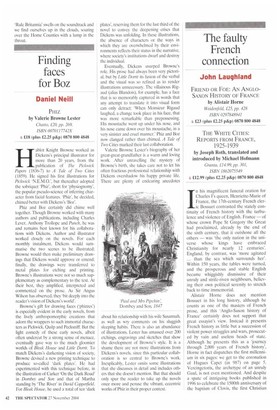A tnie poet of war
William Feaver
HUMPHREY JENNINGS by Kevin Jackson Picador, £30, pp, 448, ISBN 0330354338 & £26 (plus £2.25 p&p) 0870 800 4848 C n a hazy day Jeny conies dron i i
ng over, three miles up.' May sound Bigglcs-ish now, but it was OK for then, November 1940, in the commentary for Humphrey Jennings's brief film Heart of Britain. Nine minutes is all it takes to cover the Lakes, Lancashire, the Pennines and Sheffield, homing in on aircraft spotters, air-raid wardens, mill hands and Sir Malcolm Sargent and then panning around the blitzed centre of Coventry to the sound of Beethoven's Fifth. The action ends at full throttle with a Hallelujah Chorus from the Huddersfield Choral Society as a newly built Whitley takes off in freezing mist to give Jerry hell.
Where ordinary documentary film-makers tended to show folk joyously gutting herrings or consulting government pamphlets Jennings, grounded in Milton and knowing his Metaphysicals backwards, produced cinematic masques and sonnets. He was brilliantly clever, people agreed: starred double first and, to some, incorrigibly enthusiastic. Stephen Spender, who met him when their paths crossed in Germany after the war, noted in his diary that everything about him was irritating, 'beginning with his Adam's apple, his flappy ears, his pinhead face and his bumptious expression'.
Jennings the director, don manqué, poet, painter, occasional critic, one-time lover of Peggy Guggenheim and erstwhile set designer, can't have had much time for the assiduously plodding Spender. Most of his accomplishments — painting especially — were assimilative, which meant that he was always eager to bunch ideas and spark connections. That was why he died, eagerly scrambling to the top of an unstable cliff on a Greek island in 1950, scouting for camera angles.
Not long after Jennings's death Lindsay Anderson saluted him as 'the only true poet of the English cinema', implicitly preferring him to the more arty Michael Powell. I would go further. Jennings was, briefly, the one true poet of the British Isles at war.
'Where are the war poets?' had been a common cry in Horizon circles c. 1940. (Where the war artists were was obvious: they were out doing pictures of bombed churches and land army lasses grubbing for spuds.) Wherever Humphrey Jennings was is the answer: Jennings on location in docks and ballrooms, in works canteens and village schools and the National Gallery, Jennings in cutting rooms in Blackheath, Soho and Pinewood. With Steward McAllister, his editor, and Chick Fowles, his usual cameraman, Jennings of the Crown Film Unit created, in Fires were Started, Diary for Timothy and Listen to Britain, supremely touching and stirring works of art.
Kevin Jackson's biography enlarges on his excellent Humphrey Jennings Film Reader of 1993 (reissued by Carcanet at £14.95), adding background, family connections and hints of the infidelities that cut into the domestic life. He sees Jennings as very much a Cambridge product, consciously a Cantab renaissance man, well read enough to be immune to Leavisite chill factors. Scholarship proved too slow for him; he was happier assembling material that bolstered his aphorisms. 'Machines are animals made by man,' he remarked and with that set about compiling Pandemonium, an anthology of poetry and prose illustrating the coming of the machine as seen by contemporary observers'. This epic hymn to the industrial revolutionaries and to the bards of hell and heaven from Milton to William Morris remained unpublished until 35 years after his death. Pandemonium is a flowering textbook, a comprehensive masterpiece. History was poetry to Jennings and film, he found, was a marvellous new means of anthologising images and forming visions that in fluent sequence flickered into history. Inspiration came as much from Hardy's 'Dynasts' as from the shock elisions of Surrealism. Here he fell foul of John Grierson, the Lenin of the British documentary movement. Grierson preached the hard line: nothing clever and definitely no jokes. Happily Jennings was encouraged at Grierson's GPO Film Unit (subsequently the Crown Film Unit) by Alberto Cavalcanti, who drew no dogmatic distinction between documentary and fiction.
Jennings was one of the originators of Mass Observation, a socio-anthropological set-up recording everyday behaviour in Thirties Britain by every possible means from snaps to diary entries to snooping. Spare Time (working title British Workers) was his 1939 screen version of the MO outlook, an 18-minute survey of innocent leisure activities, featuring an all-girl kazoo band bleating 'Rule Britannia' on a bleak sports field.
The war gave Jennings the cause, the demands, the catalysts he needed. After Heart of Britain he found his way, feeding his old preoccupations into footage intended to encourage and inspire. Diehard Griersonites failed to see the point of his stream-ofconsciousness montages and the nerve of dispensing with commentaty in Listen to Britain, just letting evocative sounds echo evocative scenes on playground, dance floor and factory floor.
Recognising, up to a point, that Jennings was the only person in the unit capable of treating documentary as an imaginative means, not a didactic end, the authorities gave the go-ahead to Fires Were Started: 24 hours in the life of a fire station at the height of the Blitz, a story of comradeship and matter-of-fact heroism enacted in the docks. That was followed by Silent Village, an account of the Lidice massacre in Czechoslovakia transposed to a Welsh mining village, and Diary for linwthy covering events of the autumn and winter 1944-5 (Arnhem, mining, rain, privation, Christmas), Timothy being a newborn baby to whom events beyond the perimeter of his pram were explained by E. M. Forster, his words spoken by an understandably condescending Michael Redgrave.
After the war Jennings was lost for inspiring projects. There was the possibility of films about London and New York, but no backing. Cumberland Story, about the perils of coal-mining under the Irish sea, is written off, rather too firmly, by Jackson as 'best left to rest, unwatched, in the obscurity of film reference books'. A film called The Good Life was commissioned by the United States Economic Co-operation Administration. Doesn't sound too promising, and he had barely started on it when he went to Poros and died, aged 43. I imagine that if he had lived he would have gone into television and, who knows, he might then have made quite a difference to Lord Clark on Jennings left us Listen to Britain — and if it has dated it has done so with poetic grace. It has Spitfires over waving cornfields, trains clanking, crowds swirling around the Tower ballroom Blackpool, Canadian troops in a halted train singing 'Home on the Range'. Through the night the BBC speaks to the world. Dawn chorus. Keep fit instructions. A goods train crosses a bridge, the camera heads under the bridge, switches from road to rail and emerges past Clapham junction with 'Music While You Work' (played to you this morning on rhythmic records'), cut to factory girls shuffling razor-blade packs and singing along to 'Yes, My Darling Daughter'. Workers' Playtime, today's menu on the canteen blackboard (`Lemon Pudding Jam Sauce Damsons and Custard') and Flanagan and Allen performing 'Round the Back of the Arches', their chuntering case mixing into the sound of Mozart and a lunchtime concert by the RAF Orchestra in the National Gallery with Myra Hess plunging into the Piano Concerto in G, the audience rapt and the camera cutting away to troops on leave examining examples of war art. Back to the audience and, bless me, sitting there next to a sleekly smiling Kenneth Clark is the Queen herself, the future Queen Mother that is, graciousness personified. Empty frames of evacuated paintings, fire buckets, picture postcard racks and out to Nelson on his column, trees stirring and war production gaining pace as 'Rule Britannia' swells on the soundtrack and we find ourselves up in the clouds, soaring over the Home Counties with a lump in the throat.




















































































 Previous page
Previous page